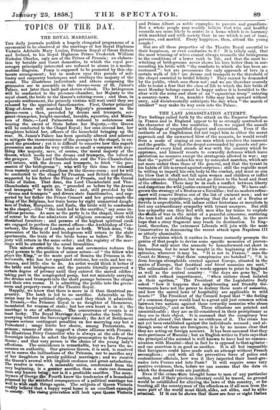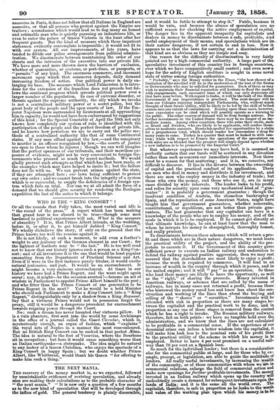i HE LAST ASSASSINATION ATTEMPT.
Tire feelings called forth by the attack on the Emperor Napoleon in France and in England appear to be as strongly contrasted as the character of the two countries. Here we regard the assault with feelings of unqualified disgust and execration. Even if the instincts of an Englishman did itot'impel him to abhor the secret approach and the unwarned blow of the assassin, he would revolt from a mode of aiming at one man which involves the innocent and the gentle. Say that the despot surrounded by guards and pre- cautions of every kind stands al war with the country- whioh he oppresses, and himself resorts to cowardly defences which leave patriotism no resource except the stratagems allowed in war; say that the "patriot" makes his way by concealed marches, which are not more unfair than those of the general, and that the tyrant in his habits of life ie armed against surprises ; still the regicide must be willing to imperil his own body in the combat, and must so aim his blow that it shall not fall upon women and children or inflict indiscriminate slanghter, but must go direct to the head and front of the °Minder. There may be in-such a conflict between liberty and deirism the wild justice excused by necessity. We have out- 'grown e strategy of a Brutu.s.or a Ravaillae ; but no modernrefine- mane will remove Brutus out of the list of eminent men ; and no' ,uiPgrauent from expediency, showing that the' act of a Brutus or Brevola is unprofitable, will induce either historians or moralists to feel any extraordinary sympathy with tyrant usurpers. Bat still less sympathy can they fed with men who lay trains to explode the' ells of war in the midst of a peaceful concourse, scattering the iron hail and dabbling the pavement in blood, in the mere hope that a stray fragment may reach its destination. In Eng- land, therefore, the extremest Liberals will join with the molt Conservative in denouncing the recent attack upon Napoleon III ai utterly abominable. The revulsion which it excites in France instantly prompts the genius of that people to devise some specific measures of preven- - tion. Not only must the assassin- be henceforward cut short in' his business, but he must be.enught in the beginning of 'his con- spiracies, wherever it may be. "It is not in France," says the Count de Manly, "that thee& conspiracies are hatched "; it is from foreign strongholds erected against Europe, situated in the centre of Europe, that fanatical and hired assassins are sent." - The collocation of the Count's words appears to point to England as well as the central country: the days are gone by," he said with refined impertinence, "*hen nations stood isolated in their egotism." The President of the Legislative Body asked "how it 'happens that neighbouring and friendly Go- vernments have not the power to destroy these nests of assassins, and how the sacred laws'of -hospitality are applicable to wild beasts ?" The President of the- Council hoped that "the feeling of a common danger -would.leed. to a great and just common action- between two nations against those cowardly assassins who abuse the hospitality," and so forth. These allusions are pointed and unmistakeable; they are as ill-considered in their precipitancy as they are in their object. -It is assumed that the conspiracy was concocted abroad ; but there is nnevidence of it. The crime has not yet been established against the individuals accused; and al- though some of them are foreigners; it is by no means clear that they are acting on foreign. aceount. It has been assumed that they were partisans of Mazzuu ; but an English writer in Paris says that the principal of the accused is Well known to have had no commu- nication with blazzinf—that in fact he is opposed to that agitator : and one assertion is as good as another. It is all but impossible that foreigners could have made :inch an attempt without French . aecemplices ; - and with all the preventive force of police and customhouse officials, how was it they imported their hand-gre- .nades into France and into Page ? It will require some very positive evidence then, befornwe can assume that the data on which the demand rests aie justified. Even if the crime-eVere brought home to men of any particular nation, and if their previous itinein4 could be traced, no ground would be established for altering the laws of this country, or for 'treating the countrymen or the offenders as if all men from the same part of the world mast tbini alike, act alike, and be alike oriminaL If it can be shown iharthern are four or eight Italian
assassins in Paris, it does not follow that all Italians in England are
esessins, or that all persons who protest against the Empire are traitors ; a conclusion which would lead us to dog many an honest and estimable man who is quietly pursuing an industrious life, or even to enter the palace of Queen Victoria in the hunt after her frequent guests. But the kind of measure which these impatient statesmen evidently contemplate is impossible; it would not fit in with our system. All our improvements, of late years, have tended to divide our police arrangements from political adminis- tration. We discriminate between maintaining the order of our streets and the intrusion of the executive into our private life. We have more and more thrown down the barriers of exclusion, whether of quarantine, or customs, or port-dues, or passports, or " permits " of any kind. The enormous commerce, and incessant movement upon which that commerce depends, daily demand increasing freedom of action. Our political power is daily en- larging its base. The measure which Lord Palmerston is to intro- duce for the extension of the franchise does not precede but fol- lows the continual progress which spreads political power over a larger number of the population. In case of extreme disorder, or threats against the supreme authority, the ally which we invoke is not a centralized military power or a secret police, but the great body of the people and the open courts of law. If the Em- peror Napoleon were surrounded by lieutenants at all approaching him in sagacity, he would not have been embarrassed by suggestions of this kind ; for the Special Constable of April the 10th not only knows how completely our system of rule is identified with the participation of the people and the perfect freedom of private life, and he 'mows how powerless we are to carry out the police me- thods of a centralized authority like that of some Continental states. If any man offend against the law,—and the conspiracy to murder is an offence recognized by law,—the courts of justice are open to those whom he injures ; though we can well imagine that the perfect openness of our tribunals, and their merciless ex- posure of evidence, might not be very convenient to foreign Go- vernments who proceed so much by secret methods. We would gladly prevent such attempts as that which has just been made or the examples which may have helped to incite it ; but the failure does not he with us. We can prevent crimes against the state, if they are attempted here ; our laws being sufficient to protect our own order ; and we cannot break into the integrity of a system which is so successful, to supply the deficiencies of a foreign sys- tem which fails on trial. Nor can we at all admit the force of a demand that we should give security for rendering the Boulogne expedition the last of the series to which it belongs.



































 Previous page
Previous page